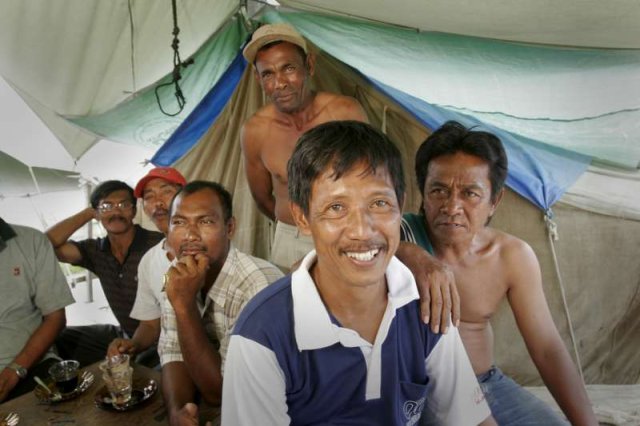
Here are some numbers. There were 51.2 million refugees and displaced people worldwide at the end of last year. About 11,000 Australian protection visas are available, worldwide, each year, for people overseas who have applied for asylum.
Australia’s total share of the 11.7 million refugees officially registered with the UN refugee agency is 0.3%.
Australia’s drop in the Pacific contribution to the rising global refugee crisis has obviously worsened under the steerage of Prime Minister Tony Abbott and his immigration minister, Scott Morrison.
It will continue to get worse too — an impending migration bill that will strip the rule of law from refugee processing and the recent slashing of how many refugees Australia will accept from Indonesia is proof of this.
Morrison will cut the number of refugees Australia would accept from Indonesia each year from 600 to 450 to “drain the pool” of people seeking to reach Australia.
Putting aside the noticeable “stopping the flood” rhetoric, a move that may seem minor compared with Australia’s recent barbarity could have catastrophic results, if not on Australia’s own shores.
The Asylum Seeker Resource Centre (ASRC) explained in 2012 the consequences of cutting the refugee intake: “From 2001 to 2009, Australia settled 452 refugees from Indonesia. In 2011, we resettled 500 and saw a decrease in boat arrivals. This year [2012] we have only resettled 59 people from Indonesia and the number of boat arrivals has increased. At this rate, the average wait time to be resettled from Indonesia is over 30 years.”
But now that Australia's navy patrolling the seas has used its Abbott-bestowed power to turn back boats, dump asylum seekers in bulbous lifeboats, and elicit allegations of assault and torture from refugee men in their custody, getting onto boats is, appallingly, no longer an option.
Australia will also no longer accept any refugees from Indonesia who registered there with the UNHCR after July 1. Morrison said he was telling the displaced people of the world “don’t bother going to Indonesia and waiting there because you won’t be getting a visa to come to Australia”.
The alternative, according to Abbott’s government, is for refugees to stay in their country and wait for the official channels to find them a safe home.
It does not need to be spelled out that this is not an option for people suffering forced displacement and the constant threat of violence via war or oppression. And anyway, according to calculations by the Refugee Council of Australia, resettling all UN-recognised refugees would take more than a century at current rates of resettlement.
That’s just refugees with access to resettlement. For Afghan refugees, who make up a large part of those who seek asylum in Australia, the process is much more complicated.
Residing mostly in camps across the border, more than 3 million Afghan people await a virtual lottery of resettlement. “If all Afghan refugees now registered in Pakistan sought resettlement through UNHCR,” the refuge council says, “at current rates it would take 8275 years to resettle just the current refugee population. Resettlement of all Afghan refugees now in Iran would take 1261 years.”
This intractable situation is what forces millions into motion, taking the offers of “people smugglers” to seek safety via unofficial pathways.
It is these millions of people who suffer while Australia enforces a racist closed-borders policy. “Draining the pool” in Indonesia may force this suffering further from Australia’s shores, but it still exists and it is growing exponentially worse.
However, the fight at home is still urgent. A bill drafted by Morrison would make changes to the Migration Act and the Maritime Powers Act that, former PM Malcolm Fraser said, would “enshrine in law the mistreatment of asylum seekers and refugees who flee to our country to escape persecution, torture and death”.
The ASRC has made one of more than 5000 submissions to the Senate inquiry being held on the bill. The advocacy and support centre said the bill will, “see the Minister give himself an unprecedented level of power to make life or death decisions about individual asylum seeker cases, without court oversight”.
In a briefing explaining the big changes proposed in the bill, the ASRC said: “The Bill narrows the meaning of refugee, ignoring previous court decisions and stacking the odds against refugees.
“For example, people could be asked to ‘modify their behaviour.’ That could mean telling someone who taught girls in Pakistan to go home and find a new job to avoid Taliban persecution.”
Asylum seekers would face “a ‘fast-track’ decision-making process, which will reduce life and death decisions to a cursory assessment by the department. Then it will be up to the Minister alone to decide if a negative decision gets reviewed. This will increase the likelihood of sending people back to danger.
“A cap on the number of visas will give the Minister the power to chop and change how many refugees are granted protection each year, leaving people in anxious limbo, as they wait for their number to come up in the ‘visa lotto’.”
Rallies have been held in major cities in light of the Indonesia visa changes, lawyers and advocates are gearing up to fight the bill, and the need to bust the government’s false rhetoric and lies continues.
Like the article? Subscribe to Green Left now! You can also like us on Facebook and follow us on Twitter.